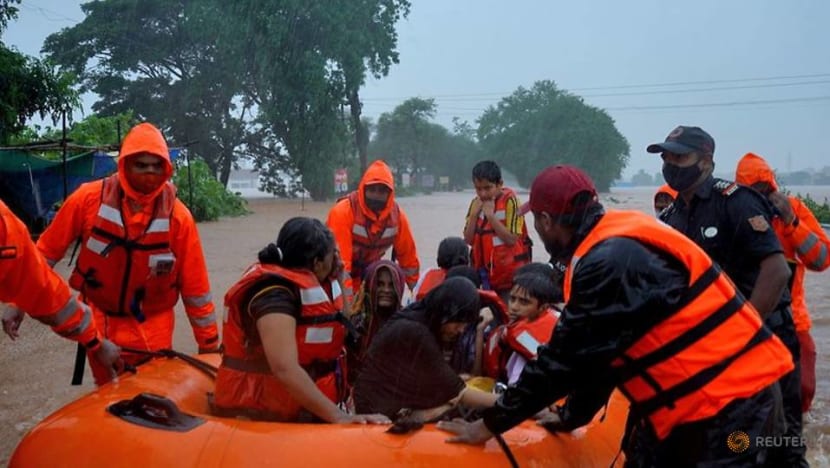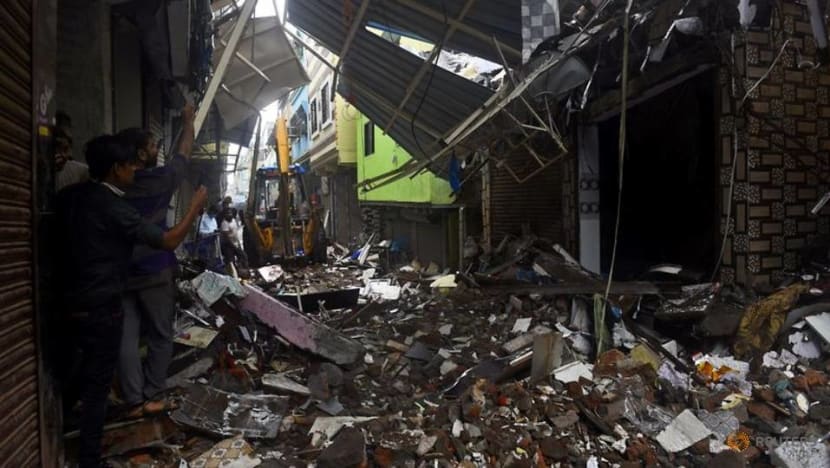Heavy rain in India triggers floods, landslides; at least 125 dead

Rescue workers evacuate people from a flooded area to safer places after heavy rains in Kolhapur in the western state of Maharashtra, India, July 23, 2021. REUTERS/Abhijeet Gurjar
MUMBAI: Rescue teams in India struggled through thick sludge and debris on Saturday (Jul 24) to reach dozens of submerged homes as the death toll from landslides and accidents caused by torrential monsoon rain rose to 125.
Maharashtra state is being hit by the heaviest rain in July in four decades, experts say. Downpours lasting several days have severely affected the lives of hundreds of thousands, while major rivers are in danger of bursting their banks.
In Taliye, about 180km southeast of the financial capital of Mumbai, the death toll rose to 42 with the recovery of four more bodies after landslides flattened most homes in the village, a senior Maharashtra government official said.
"About 40 people are still trapped. The possibility of rescuing them alive is thin as they've been trapped in mud for more than 36 hours," said the official, who declined to be identified as he is not authorised to talk to the media.

Harsh weather has hit several parts of the world in recent weeks, with floods in China and Western Europe and heat waves in North America, raising new fears about the impact of climate change.
According to a Potsdam Institute for Climate Impact Research (PIK) report published in April, climate change is making India's monsoons stronger.
The report warned of potentially severe consequences for food, farming and the economy affecting nearly a fifth of the world's population.
READ: City in China's Henan province picks through debris after record rains kill 33
Parts of India's west coast have received up to 594mm of rain, forcing authorities to move people out of vulnerable areas as they released water from dams about to overflow. The hill station of Mahabaleshwar recorded its highest ever rainfall - 60cm in 24 hours.
Rescuers were searching for victims of landslides in four other places in the state, the official said.
READ: Struggle and suffering in India as climate change bites, but what next after ‘brutal’ floods?
"Around 90,000 people were rescued from flood-affected areas," the Maharashtra government said in a statement, as authorities released water from overflowing dams.
Flooding and landslides are common during India's treacherous monsoon season, which also often sees poorly constructed buildings and walls buckling after days of non-stop rain.
Four people died before dawn on Friday when a building collapsed in a Mumbai slum, authorities said.
Thousands of trucks were stuck for more than 24 hours on a highway linking Mumbai with the southern technology hub of Bengaluru, with the road submerged in some places.

Prime Minister Narendra Modi said he was in anguish over the loss of lives.
"The situation in Maharashtra due to heavy rains is being closely monitored and assistance is being provided to the affected," Modi said on Twitter on Friday.
In the southern state of Telangana, heavy rain caused flooding in the state capital of Hyderabad and other low-lying areas.
Indian environmentalists have warned that climate change and indiscriminate construction in fragile coastal regions could lead to more disasters.
"The rain fury that lashed Mahabaleshwar ... is a strong warning against any more tampering with the ecologically fragile Western Ghats," environment economist Devendra Sharma said on Twitter referring to the range of hills along India's west coast.










